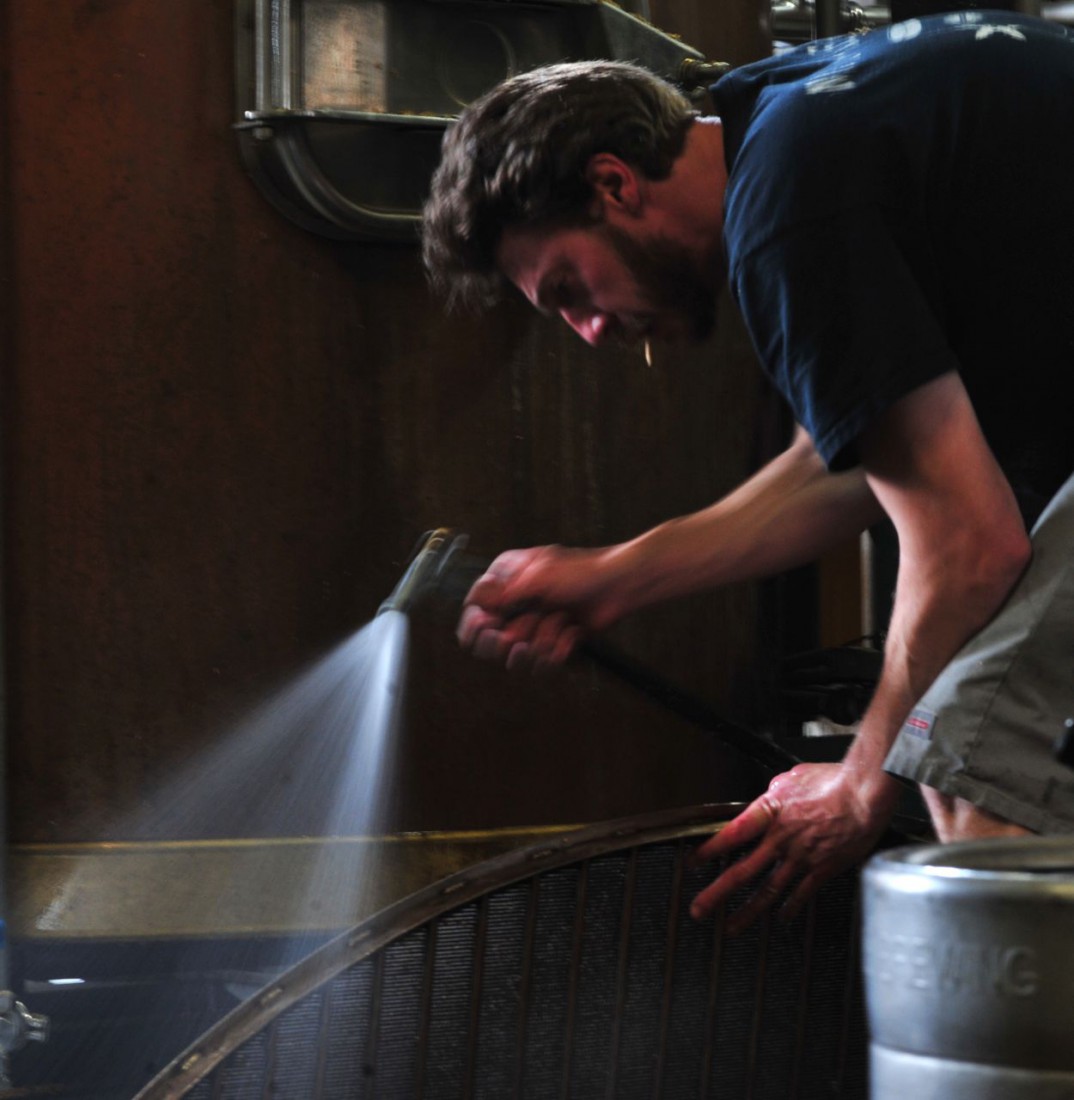Water, water everywhere
Beer is primarily a tasty water-delivery method: Water accounts for about 90 percent of what you’re imbibing in beer. And while beer lovers geek out about different varieties of hops, yeast and malts, we often ignore this crucial ingredient.
But water can make or break a beer — or a brewery. Indeed, one of the reasons we have so many breweries in Western North Carolina is the good mountain water that flows into their mash tuns. This soft, pH-balanced water requires minimal treatment before brewing, though some styles do need specific salts and minerals added to bring out their particular flavors.
In 2010, the primary breweries in the city of Asheville used more than 12 million gallons of water and paid about $52,000 in water-consumption charges, as well as other water-related charges, Water Resources Director Steve Shoaf reports.
“We would like to think that the quality of our drinking water has contributed to the success of the many local breweries,” says Shoaf. “Our local breweries are part of the experience that is Asheville, and we definitely appreciate their commitment to the community and their contribution to our economy.”
But while 12 million gallons might seem like a whole lot of water, it accounts for only about 0.23 percent of the city’s direct water revenues.
It typically takes about three gallons of water to produce one gallon of beer, though Pisgah brewmaster Jason Caughman guesstimates that it’s less at Pisgah and other small breweries, which tend to be really efficient in their water use.
Quantity aside, continues Caughman, “The water here is awesome: All we do is dechlorinate it. It’s the perfect soft water for making lagers, which is what we’ll be doing all winter.”
Brewers take note of both the water’s mineral content and pH when brewing.
The mineral content (also known as hardness) is measured by the amount of dissolved minerals (bicarbonate, calcium, magnesium) in the water. Historically, certain regions have become famous for particular beer styles, which developed, in part, because of the water available for brewing.
The city of Pilsen in the Czech Republic is renowned for having some of the softest water in the world — ideal for producing the city’s namesake pilsner. On the other hand, Burton-on-Trent in England has particularly hard water (high in calcium sulphate), making it an excellent medium for pale ales (if you ever get a whiff of sulfur off a U.K. beer, that’s why).
Caughman compares Western North Carolina’s water to that of Munich, Germany, a hub of the brewing universe, whose water profile is closer to Pilsen’s than to Burton-on-Trent’s.
Thus, brewer Carl Melissas adds calcium salts to the mix when cooking up the Wedge’s Iron Rail IPA and some of his other signature brews, but Asheville’s soft water, he notes, makes altering it easy.
According to Melissas, the ideal pH for brewing is 7, which is neutral (neither alkaline nor acidic). Asheville’s water has a pH between 6.5 and 8.4 but averages around 7.
“It’s best to start out with neutral water,” says Melissas. “It’s like cooking with salt: It’s easy to add but difficult to take away.”
Water quality has been cited as a possible reason that New Belgium Brewing and Sierra Nevada are said to be considering setting up operations here.
When I asked Caughman what else he could tell me about the region’s water, he replied, “Just protect it — please.” For the beer, y’all.
Celebrating Craggie
Craggie Brewing will be celebrating its second anniversary from Nov. 16-19, with live music every night and a couple of special beer releases. The brewery has just created a Coconut Brown Ale, which is conditioned on toasted coconut and cocoa nibs from Black Mountain Chocolate. Also soon to be released is their Belgium Quad, a 10-percenter. The celebration will culminate with a cake-and-ice-cream party on the 19th featuring Artista cakes and ice-cream/beer floats with hop ice cream.
Asheville Beer Week
Mark your calendars now, beer lovers, for Asheville’s inaugural Beer Week, scheduled for May 25 to June 3 (Yes, that’s more than a week. Guess the organizers were imbibing while hatching their plans). Following in the footsteps of cities such as Philadelphia and San Diego, Asheville aims to step it up a notch, offering everything from beer dinners to pub crawls to special tastings. The party will culminate at the annual Beer City Festival June 2. Details will be released as they become available. Cheers!
Correction: Asheville Coffee Roasters provided the coffee beans for this year’s edition of Pisgah Brewing Co.’s Valdez Stout — not Mountain Air Roasting, as stated in our Nov. 1 print edition. Apologies to ACR. The second batch of Valdez is available on draft around town.






Do any of the local breweries do anything to remove fluoride?
…’cause that leads to communism. Precious bodily fluids, & all.
Hey Ian and Drew,Long time no chat. Glad you guys enjoyed Port City to be sohent I have not been a fan after having tried some of their beers over the summer. Might be worth revisiting though. If you guys are looking for a good NOVA local brew, you should check out Lost Rhino in Ashburn, VA. The brewmaster was the former brewmaster at Old Dominion before it was bought out by AnnheiserBusch. If you guys come up this way, let me know I would love to meet up.~Evan